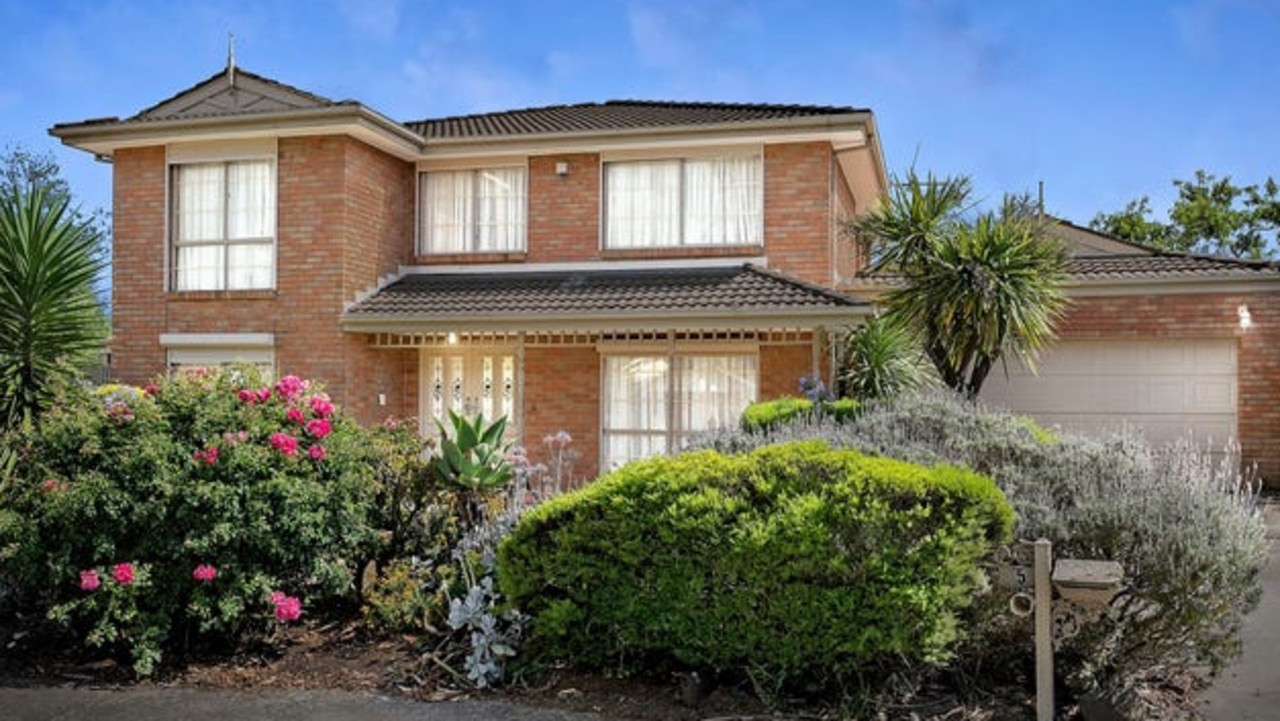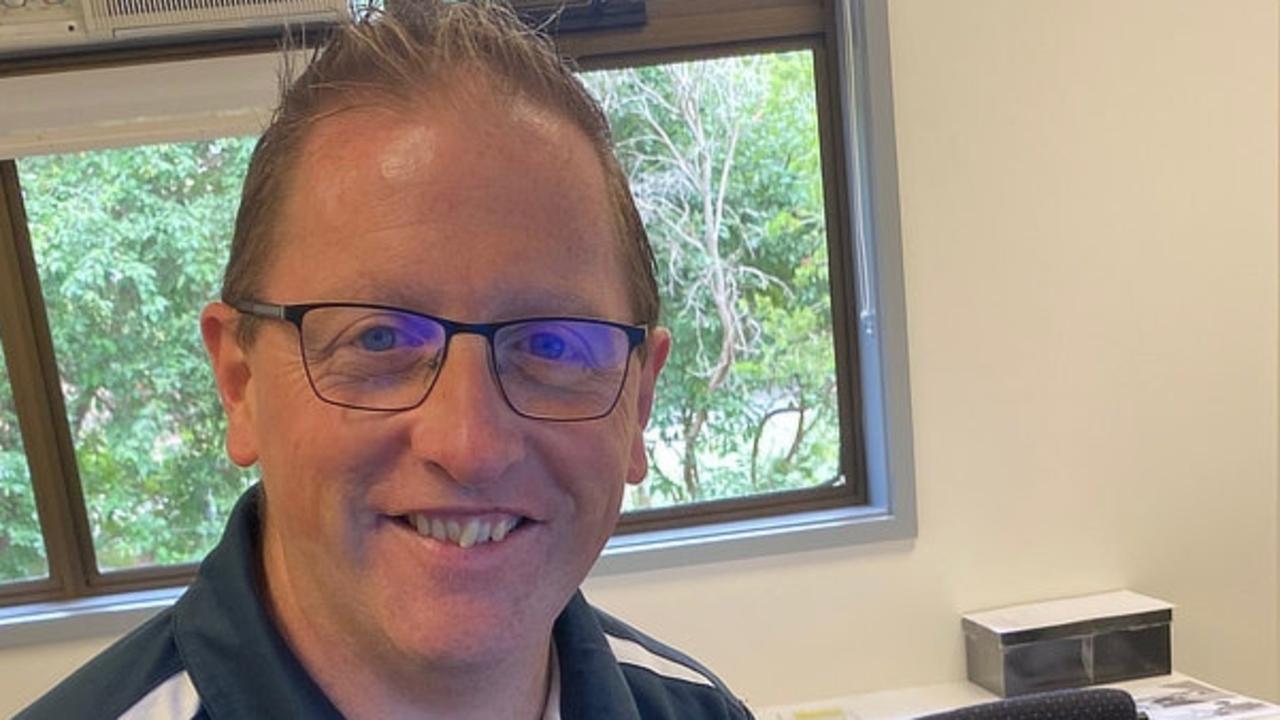‘Lots of big white dots on scans’: Carlton’s Sam Docherty fought back from stage 3 cancer
When Carlton’s Sam Docherty was first diagnosed with testicular cancer, he feared he would die. Then it came back in his lymph nodes, lungs and stomach. But he beat it all to play again.
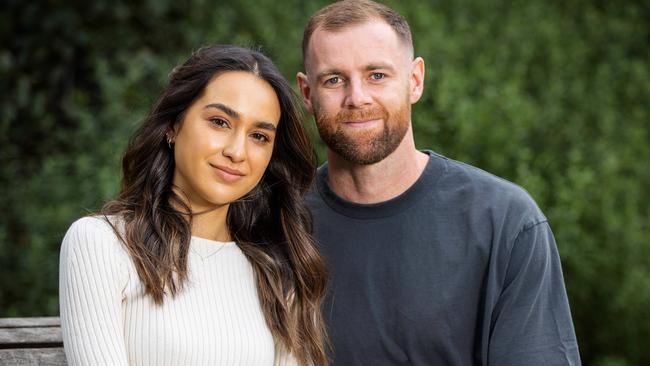
News
Don't miss out on the headlines from News. Followed categories will be added to My News.
Some people show us what is possible. Sam Docherty is one of them.
A player who started his AFL career with the Lions, and then came home to Victoria to play with Carlton, the club he barracked for as a kid. He lost his father Eddie in 2013. He did his ACL in the pre-season and missed all of the 2018 season. He was about to return, and then did it again, and missed all of the 2019 season. He returned in 2020, and missed just one match. In November of 2020, he was diagnosed with stage 2 testicular cancer. He had surgery, and remarkably, returned to the field in 2021. In August last year, he was diagnosed with stage 3 cancer, and it had spread through his body. He entered into a 12-week chemotherapy program. Not many thought he would ever play football again.
But Sam did. His father would be proud.
HM: Life’s got an extraordinary way of giving you perspective – and you’ve had more than your share.
SD: It does. I had my old man pass away, and then my cancer diagnosis. I keep getting a dose of perspective that I’d prefer not to have!
HM: Your father passed away, an ACL in the pre-season, recovered, another ACL in the pre-season, and then in November of 2020, who tells you you’ve got testicular cancer?
SD: It was my doctor at the time, Phil Bloom, who’s not at the club anymore. He gave me a call. I had the scan, and I tried to talk my way out of it when I was having the ultrasound for the first time, thinking it was just a cyst and it was all good. I got a call when I got home, from Phil, saying it’s not what they thought it was. “You’ll need to go in for surgery.” We’re lucky at footy clubs, we get the best of the best. I got in to see Damien Bolton, my surgeon, the next day. It was a public holiday, and he’d taken time out of his own day to come out to the hospital to walk me through the whole situation. I had surgery the following day. It was a bit of a whirlwind, that first one.
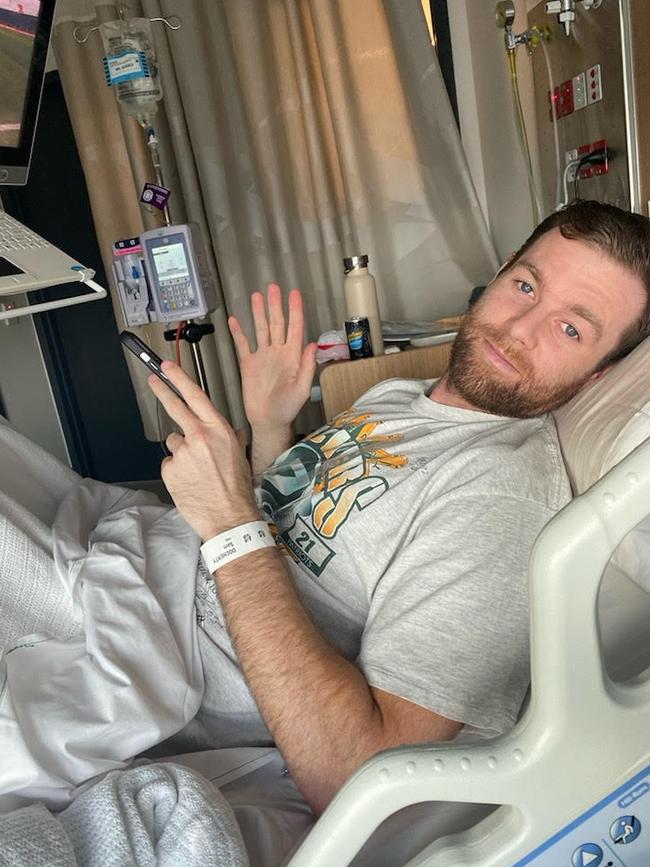
HM: You had surgery to remove your testicle?
SD: Yes, exactly. The first step is to try and cut out the tumour, because that is where the cancer is growing. If you can cut it out, you can hopefully get rid of it. Mine had spread a little bit; we were hoping we’d got it all, but it turns out we hadn’t.
HM: At what stage did you realise they hadn’t got it all and it was still lingering? Were you thinking it was OK, or had there been signs that concerned you?
SD: Looking back now, there might have been signs. At the time, I would never have noticed. I had scans every three months to check how it was going. I look back now, and I wasn’t running out games as I had been in the past, I was finding breathing more difficult, but I was just assuming it was just a part of footy. You start to decondition a little bit. I wasn’t running on top of the ground as I would have hoped, but looking back now, I had a good reason as to why I wasn’t able to do that. The cancer was back. That’s the process, and that’s the ongoing thing that I still have now. I need to stay on top of it. I keep going back to Peter Mac now to get my scans, to get my bloods done, and they are then checked off by my oncologist.
HM: In 2020 you have the surgery, then in August 2021, there is the second diagnosis. That came from a routine check?
SD: Yes, a routine check. It came back that it had moved significantly.
HM: Spread?
SD: It came back, went to my lymph nodes, ended up in my lungs and my stomach. I didn’t see my scans for a long time until I was shown while I was getting my treatment. I thought it was only a small amount that was going to be treated quickly. Turns out there was a lot in there, a lot of big white dots in my scans. It was scary. I played it down a little bit in my own head, but it was a significant thing to try and figure out. The two diagnoses were completely different.
HM: A harrowing ordeal.
SD: We laugh about it now, but with the first diagnosis I got, when they said I had cancer, I thought I was going to die. That’s the first thought that went to my head, and the first thing I associated with cancer, through a lack of knowledge. It wasn’t until I went and had the meeting with Damien Bolton when he said to me, “This is all right. You’re going to be OK. The survival rate of testicular cancer is extremely high”. At the time, you don’t realise that. The chaos of it all, and the whirlwind of my first surgery, was significant. The second time I was a lot more pragmatic. Let’s get the treatment, we know what to do, it’s treatable. But, at the same time, I was far more nervous because it had progressed a hell of a lot more than what we all thought. It’s a tough thing to go through, but I know there are a lot of cancer survivors watching this that will have had the same thinking.
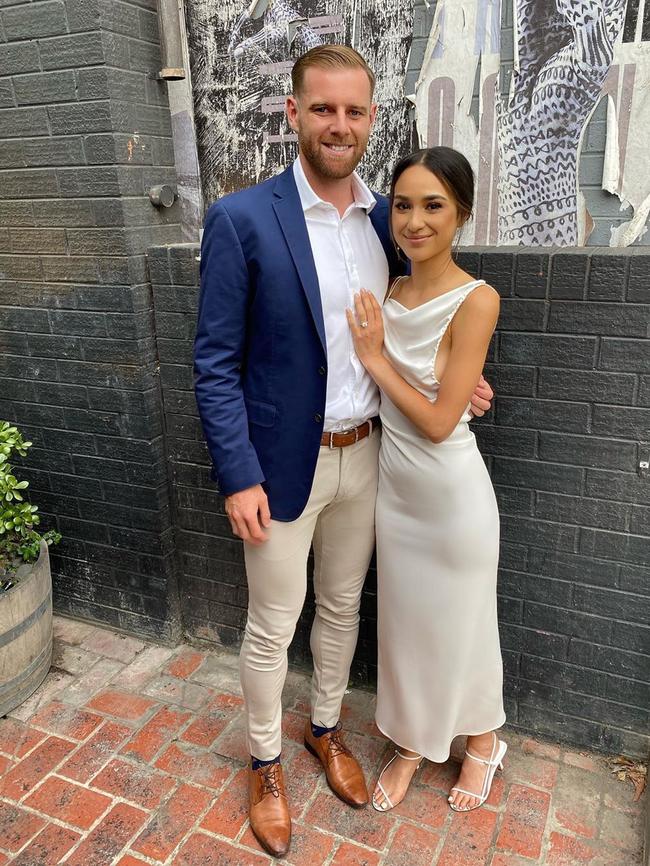
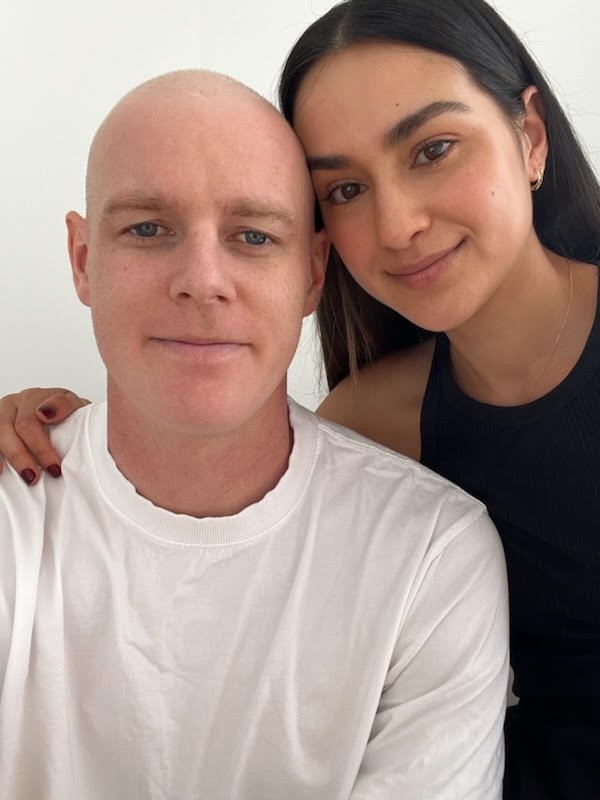
HM: Is Nat, your wife, your first phone call after diagnosis?
SD: With the first, I walked up the stairs at home, she was standing up the top of the stairs, and she just looked at me and said, “What’s wrong?” Neither of us had any idea what it was about, or what it all meant. The second time around, she was with me at home, and we just cried and cried together.
HM: You are in it together.
SD: Nat rides the waves as much as I do; sometimes I feel like I’m throwing it all on her plate even though she’s not going through the treatment. She watches me go through it as a partner. The position I am in is the easier one. The other side is a sense of helplessness, trying to do everything you can, but not being able to do much at all. Having to ride that emotional rollercoaster but trying to stay strong. I am blessed, and lucky, to have found someone who through thick and thin has always been there for me, caring for me, and getting me through everything I’ve had to go through.
HM: Imagine doing it without a loving, brilliant wife, or partner.
SD: I don’t think I would have been able to. For the last treatment, I was so lucky that she was at home. I needed full time care. Most of my time at home was spent feeling sick, trying to sleep, having no energy to do anything at all. I was never hungry, didn’t want to eat food, and had to be told when to eat. Half the time I couldn’t eat it anyway. Because of Covid, I was essentially alone apart from that. We had friends and family come past the front door, but because of my compromised immune system, we couldn’t really spend much time together. If I saw anyone, I had to socially distance. It was bloody tough, and I was extremely lucky that I had Nat there to help me and push me through.
HM: When you were diagnosed for the second time, that was the first time you had to entertain essentially putting poison into your system through the chemo. When they administer it, they are in protective suits because of the damage it can do, and you are putting it directly into your arm. It must be terrifying?
SD: I was naive, and that was a good thing I think. I didn’t know how hard it was going to be. I had people telling me that it was tough, but I didn’t really take it all in. I’m a bit like that. Things need to happen to me for me to believe and understand it all. I went in there, and they were coming in dressed in full gowns, protective clothes, and gloves. Some of the drugs are in black sleeves because they couldn’t be in ultraviolet light, and then it’s being pumped straight into your veins.
HM: You are watching it go into your system.
SD: They gave me what is called a PICC line, which my doctor chose. It meant I could still play golf if I had enough energy. They put a button in your heart, and it pumps it straight in. The bag is next to you, and there is a machine that pumps it into you for hours on end.
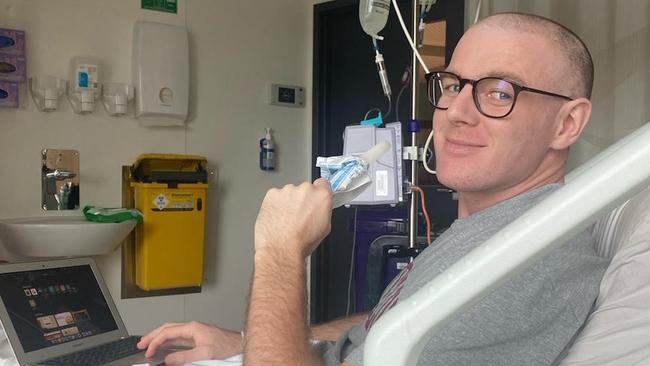
HM: Are you alone?
SD: For the first cycle, Nat was in every day, from 8am until 9pm, for five days straight. For the second, third and fourth cycles, Covid kicked in. I lost visitation. No carers and no visitors, because if Covid came through the ward, it would be catastrophic. Cycles two and three were tough.
HM: Explain the chemo cycle. It’s a 12-week program you had to endure to get through to a point where the doctors were satisfied, where they had given you enough poison to combat the cancer.
SD: The program that I was on was five days, with 12 hours spent hooked up to the drip. I had two weeks to recover in between cycles. That was the three-week cycle, and I did the cycle four times. My last cycle was going in the right direction, so we dropped one of the drugs, and went from 12 hours on the drip to six or seven. That was better, and I could go in and out.
HM: How ill were you feeling by the end?
SD: At the end I was feeling so sick, that for my last cycle I only ate noodles and easy mac. I couldn’t stomach anything and soups were about as far as I could go. It got progressively worse, and worse, and worse. My health deteriorated, hair, energy, nausea, and sickness. It was all day, every day. In my early couple of cycles, I was still out running, trying to get fit for pre-season. I distinctly remember going for a run in between my second and third cycle, and after the run I got in the car, and felt very, very ill. I went home, sat on the bed, and Nat looked at me and said, “You’re an idiot. What are you doing?” I ended up sleeping for the rest of the day. I decided from then on to take a break and rest up. Running was more to look after my mental health than anything else, to get out of the house and go and do something. I played a few rounds of golf, which kept me sane, but the week of treatment and the week after, I couldn’t do anything. I was just too weak and sick. I had one week of trying to do some exercise, to walk around, play some golf, and see some friends in the park. It was tough.
HM: What did your weight go to at its lowest ebb?
SD: I got down to 78kg, which is 10kg off where I should be.
HM: And just felt crook, weak and frail?
SD: I had nothing. No energy. I’d go for a 1km walk and get tired, I lost all my muscle, and I looked very sick. I look back at photos now and realise just how sick I looked.
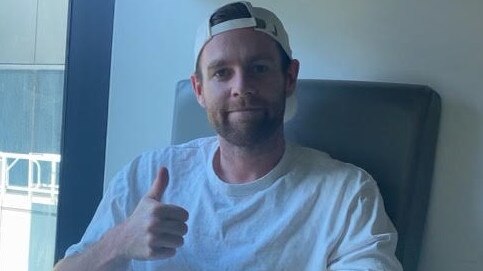
HM: You felt sick, and physically you had deteriorated. Did you ever fear the worst?
SD: I wasn’t scared I was going to die, but I felt extremely ill. I would catch up with people and they would try to act like I didn’t look that bad. I knew that I looked really, really bad. I had a good oncologist at Peter Mac, and a good team there. They were unbelievable for me. My oncologist was so positive about where everything was trending, and every time we’d made a step forward and the cancer had decreased in size, it made it all worth it.
HM: You could see progress.
SD: You could see that you were going to be OK. I had blood thinners every day for five months, and it wore thin. Really thin.
HM: How were you mentally? You have been through so much, but you have had to keep finding a way to keep walking through hell.
SD: I really struggled. Being naive was good because I thought it was bad the first week, but I’d go in again and it would just get worse. By the end of it, I didn’t even want to go in. The last cycle was when I could go in and out, and I just dreaded going in and hooking back up. As soon as the chemicals went into your system, you felt the sickest you could ever possibly feel. You felt like throwing up the whole day, you’re trying to eat but you can’t, because everything you put in your body makes it even worse. But if you don’t eat, that makes you feel worse. Mentally, the alone feeling, not being able to have Nat in there, or anyone, was tough. I couldn’t sleep very much in terms of the drugs going in. It’s 18 hours a day sitting in a hospital by yourself, feeling too sick to look at your phone or watch TV. You are by yourself with your own thoughts. I’d call people, and you’d be given encouragement, but that sense of loneliness was hard to shake.
HM: During your chemo, the club was imploding. You were co-captain at the time, and at your insistence you’re on the zoom meetings, while you’re getting chemo.
SD: It’s important that you see your job through. I understood my significance of being a co-captain; my message was that you don’t let anything get in the way of what you need to do. My first cycle was when a lot of the decisions were being made, and a lot of the review findings were being given to the club. There were several zooms that I was on that week – the nurses thought I was working a day job still. I certainly wasn’t doing that, I was just sitting in, listening, showing my face, showing my support. There were some tough moments throughout that period, but I didn’t want to be away from the club. Although I was getting treated for cancer, I still felt like I had something to give back. That’s why I did it.
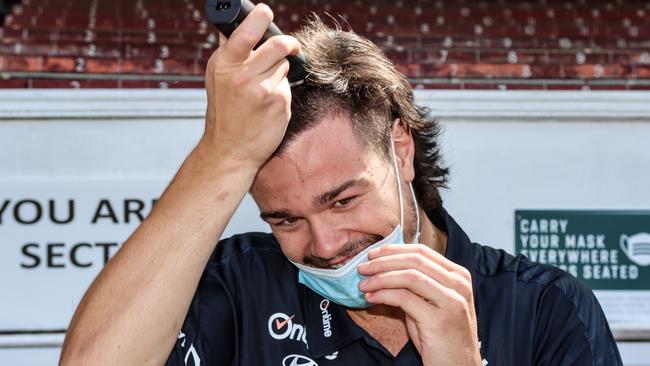
HM: Your treatment ended well but didn’t start smoothly. It was a debacle just before your first treatment?
SD: A shambles! My last blood test before going in for chemo was just a check off. Blood test on Tuesday, start the treatment on Friday. We found out on Thursday that the testing place had become a tier one site!
HM: Not ideal.
SD: Not ideal. The other thing that happened that week was getting my first Covid jab. Such was my luck at the time, I had a reaction to that where I thought I was having a heart attack! I went to emergency, spent the night in emergency, and luckily enough it was just an acute version of what it was. No ongoing effects. It meant 14 days of isolation, which pushed my treatment back two weeks. I had my first bout of treatment when we were going through the review findings, and after that, my wife, Nat, went to a doctor’s appointment on the Monday. We had two days post treatment where we thought we were all good, and then tier one exposure site again! Another 14 days, my whole 14 days between cycle one and two. We were locked inside together, we had friends dropping coffees at the front door standing across the road to say hello. It wasn’t the best start.
HM: Horrid! You chose to post your own story to humanise what you were going through, rather than having it go through the club or through a communications department.
SD: The hard thing with all this stuff is sometimes the narrative goes with how the media want to portray it. Because I am a footballer, sometimes it goes down the football path. The reason I posted it myself was because this was my life, I am not a footballer here, this is not my career, this is me as a human. I hoped by doing that it would give everyone some perspective, that it wasn’t a football issue. It was a life issue. Everyone treated me so well throughout that period, and everyone reported on what was happening. I am thankful for that. It was nerve-racking thing at the time, and when you are in the position I am in, your life is public. You don’t really have a choice.
HM: You met with Michael Voss for the first time through the 12-week program?
SD: I did – it was October 14, which was in between cycles three and four.
HM: Almost your lowest ebb?
SD: It got a bit worse with my last one, but by that stage my weight was in the high 70s.
HM: You’d lost every hair on your body.
SD: All hair. Eyebrows, eyelashes, everything was gone. I was as pale as someone that hadn’t left the house for four months, and I was sick from the drugs. He saw me at a bad time, when I started wanting to catch up with people again. Everyone had seen photos of me and been following along, but seeing me for the first time was confronting. That was the first time we had seen each other for eight years.
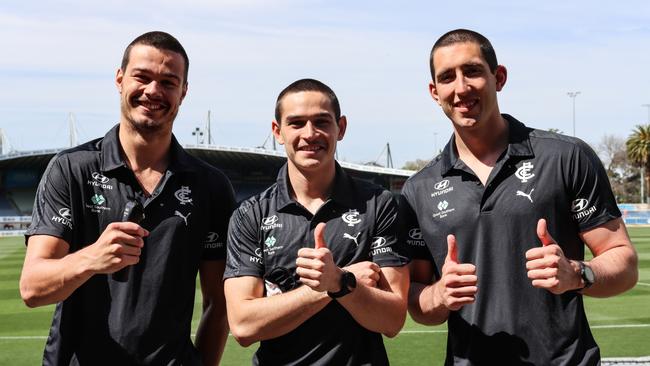
HM: He and you spoke, and you said to him, I’ll be all right for round one?
SD: That’s the competitor in me! If you don’t have the dream, you’ll never get there. I set out and knew there was a timeline. I was just hoping I’d have enough time. He asked me what my goal was, and my goal was to be there for round one. That was me being honest; whether I got there or not was another question. The timeline of it all was stretched in the end, and it wasn’t all smooth sailing. I was lucky enough to get a good training block in at a key point of the pre-season that I needed to get to. Even a little niggle in my calf before the start of the season wasn’t enough to keep me from playing.
HM: He didn’t believe you. Did you believe that you would play round one?
SD: I have toyed over this a bit. Looking back now, I can’t believe that I got there.
HM: You were in the middle of chemotherapy less than six months ago.
SD: I can’t believe it now. During the time spent trying to get back, there was no way I wasn’t going to be there. In my own head, there was no way I wasn’t playing.
HM: Now, day to day, you are back playing, what are the affects? Pins and needles, and tingles?
SD: I’ve been lucky with the post-chemo side effects. After the treatment, for the month afterwards, I was still feeling sick, and low on energy. Most of the side effects went away, but two months ago, I started getting a numb feeling on my feet and the tips of my hands. That’s the neurotoxicity from the chemo, which sticks around for anywhere between three and six months. I have been quite lucky in terms of what you can experience.
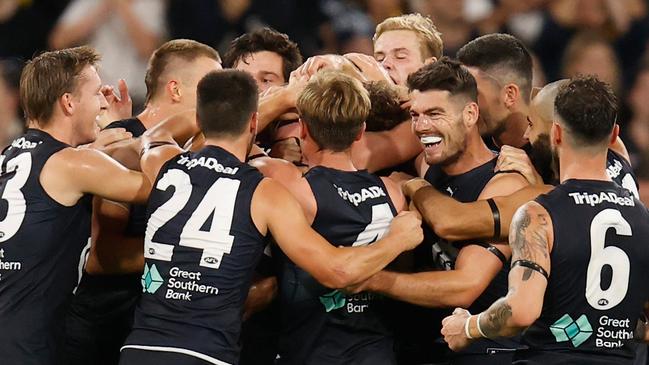
HM: What about your overall perspective on life now?
SD: Everything that happens to me is a way to be better as a person. This cancer in the last six months has taught me to be grateful. Be grateful for what you have. Sometimes you get stuck in a moment where you’re always searching for something else, whether it’s a new job, to play better footy, whatever it is …
HM: Something shinier.
SD: Yeah, always wanting something better. I have been caught in that trap as well, trying to get to something else. This has taught me to be a bit more present, more grateful for the people around me, for what I get to do. Throughout this whole process, my friends and my family have been unbelievable. I don’t think I would have been able to get through the ordeal without them. From my mum to my brother, to my close group of friends, to my manager, wife, and the footy club. I’ve had to lean on a lot of people, and I said this to the boys when I got the diagnosis. “I’m going to need to lean on a lot of people”, and inevitably, I did. Everyone stood up when they had to help me, whether it was a conversation on the phone from someone who wouldn’t even realise they were helping me, to food being dropped at my door. It was incredible. When I saw people shaving their heads, I sat there crying in hospital for half a day. People that I don’t even know are shaving their heads in respect for my journey. I got to see a good side of the world. Everyone came together, and it was incredible to be a part of.
HM: My gran always said “something good comes out of everything”. The Doing It For Doc campaign was a wave of empathy, support, emotion, and humanity, flooding towards you.
SD: Part of me thinks we all needed it, in a way. We’ve been through a couple of tough years with Covid, and everyone needed something to connect to. The group at the club that threw it all together, to all the boys that shaved their heads, the staff, the media team that pumped it up. It went so far above anything that any of us thought it could.
HM: You were hoping for $500 or $10,000.
SD: There were a bunch of them that wanted to do it anyway, and then Crippa said, “Why don’t we just try and get some money and put it towards Peter Mac?” Lil at the club set up the page, and I put in $500 to get it rolling. If no one else puts in, at least between me, Crippa and Lil, we might be able to pump it up to near $1000. We were at $150,000 in one day, and it finished at $220,000. What made me most proud wasn’t people donating $2000, $5000 or $10,000 – I had messages from kids who’d given up their pocket money for the week. Kids were tagging me on Instagram, donating $5. I am proud to be able to give back to an organisation that got me through the hardest moment of my life, from nurses, to staff, to the cleaning lady that would bring me my food and say hello every day.
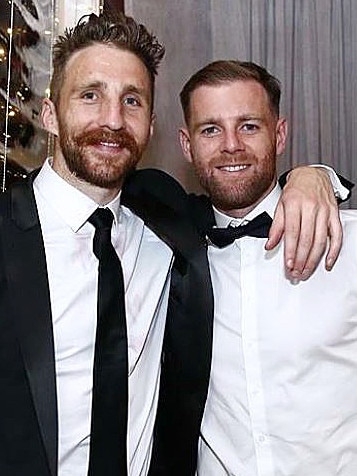
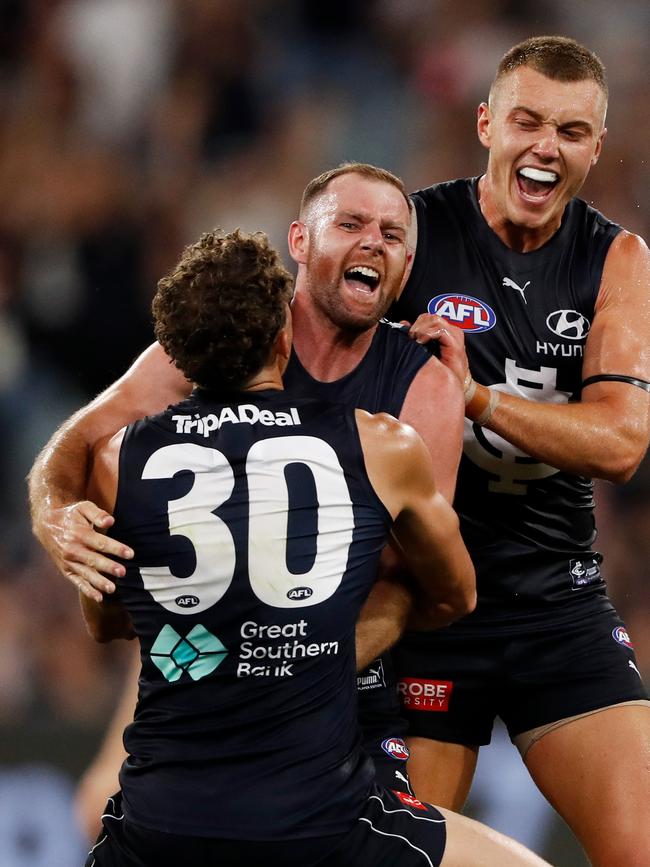
HM: You wrote a letter of thanks?
SD: I wrote a letter to the boys at the club. It’s hard enough talking to your mates about it, but I wrote a letter and read it in front of the group. I just thanked them, not only for the impact they had on me, but the impact they had on so many people. That money went not only to those with testicular cancer, but towards bright ideas to cure cancer. They could have saved millions of lives, and none of them realise that. I told them all that it meant more to me than anything else in this world.
HM: It’s amazing how football clubs, and the football community, come together when they need to. A young kid giving up his pocket money for the week to support you, in the end, supports another young kid.
SD: It does. With cancer, the misconception we all have is that it doesn’t get people that are young. It does. That’s the hard part. Everyone will be affected with it in their life at some stage, whether it’s a close friend, a family member, or themselves. I am proud of everyone that donated. To get it to where we did, there would had to have been thousands and thousands of people putting in small amounts of money. It showed a good part of our world, and the people in it.
HM: How have you and Nat been through it all?
SD: We’re great. I don’t know how she is not sick of me yet! We have been together since we were 16, we’ve had a lot of shared experiences, and a lot of life has been lived together. As I said before, I am so grateful that I have a wife that through thick and thin has been there for me, and has helped me through everything. We have been married for two years and had a rough time of it. I am so thankful for who she is. Just incredibly lucky.
HM: In sickness and in health, for better or worse. Your first two years of marriage with Nat have been trying …
SD: We were married in January 2020, and then we had the hub experience. About two or three months after getting married I jumped on a plane and left for four months. She came over to the hub, and when I left the hub was when I came home to get tested for the first cancer. Surgery, recovery, then got to the season, played the season, then cancer again, and chemo. That was two years in January, we are just past that now.
HM: You’ll be able to survive anything now, you two. Who told you you’d play round one?
SD: Vossy. He wanted to let me know as soon as he could. We’d had chats throughout the pre-season, and I’d had a few setbacks. I had the ankle early, then the calf, but we just stayed in contact, talking about my program, and how I was going. I came back through the VFL, and he said to me at the start, “If you’re ready to go, I’ll pick you. I promise that I won’t shy away from the selection of you”. I just had to keep going, I knew I had to play well in the VFL, and I was lucky enough to do that. I had to keep getting through training sessions, and once we were through all those sessions then we’d have the conversation. He let me know Saturday afternoon, but it had to stay watertight. Once he told the media everything was built up from there, and it was an emotional week. I’m not sure how my energy was up, or how I was able to stay ready for the game. It was good to be back out there.
HM: How was it walking up the race, out onto the ground, and to have Blues supporters there?
SD: I got there 2½ early. I wanted to go out and have a moment on the ground to take it all in. I went out there, and I didn’t realise how early the fans get to the game! I walked up the race, had a moment walking around the oval, walked to the far end of the oval and all the fans started piling in. It rattled me a little bit. I wanted to take a moment to be grateful that I am here, to be able to play and do what I love. There are a few moments that stick in my head. One of my best mates is on the microphone pregame, he does our home games, and he hammed it up a bit when he was yelling out my name. Everyone stood and clapped – welcome back to footy! There’s a photo of me in the last quarter where I have the ball, and the whole crowd is standing and clapping. It’s one of the most special games I’ll ever play in. The way it panned out, the win, the goal, there were a lot of things that went right.
HM: You know you don’t get a standing ovation, and universal admiration, without being a good bloke.
SD: I’d like to think I’m that, but you never know really. There’s a lot of people that cared about my story, and what I’d been through. A lot of people are touched by cancer.
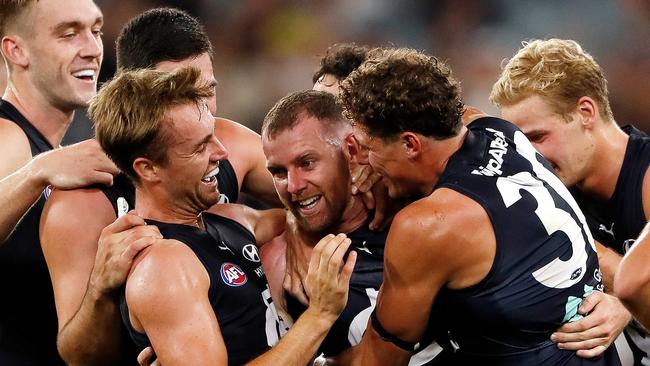
HM: It’s amazing when you’ve got an illness in your family, whether it’s yourself, or one of your kids, how suddenly the hospital, doctors and the nurses become the most important people in your life. You realise how brilliant they are, and we are just so lucky to have Peter Mac.
SD: We are. I can’t speak more highly of Peter Mac and their staff. The people that impressed me the most were the nurses, partly because I was in there by myself for a lot of it. The only interaction I really had was with the nurses that came in, my oncologist that came in every now and then, and the cleaning lady that picked up my food. Their care is unbelievable, and I have so much admiration for what they do as a job. The Covid situation was happening at the time, so they’re all trying to catch trams in, the public transport system is down, and all they care about is you.
HM: Trying to keep you alive.
SD: Trying to keep you alive, treat you, and keep you somewhat happy, which can be hard to do in there. They are amazing people. Every person I had in there was unbelievable, and it’s a testament to Peter Mac. I am looking to do some stuff with them moving forward. You don’t know how good they are until you need them and, thank God, we’ve got them. From every specialist in there, from nurses, through to people at the door, they are great people, and I have so much admiration for them.
HM: What was the most scared you became?
SD: The start was scary, finding out that it had progressed that far, and not understanding exactly where I was going with it all. Getting the stages all laid out to you was further than I thought it had been. That was the scariest by a fair stretch.
HM: When you saw Vossy for the first time, could you see he was startled by your appearance?
SD: I could see everyone was startled by my appearance. I went to a friend’s engagement after I finished, and Jack Silvagni walked past me and didn’t even recognise who I was. It was Dan Gorringe’s engagement, and it was the first time I’d been out of the house for a long time. He had to do a triple take of someone he’d known for years. I looked unrecognisable towards the end, a completely different person. All the life was sucked out of me, no hair, and very pale. A sickly pale.
HM: And when Vossy says you’re in for round one, how do you look and feel then?
SD: That night I went out for a walk, and he called me. I was in the middle of the CBD hugging my wife, nearly in tears. It was a special moment, the hard work that we’d put in over that period … we got there. I felt anxious because I knew what was coming, and I just wanted to play well and do my part for the team. It’s one of those games where a lot went right.
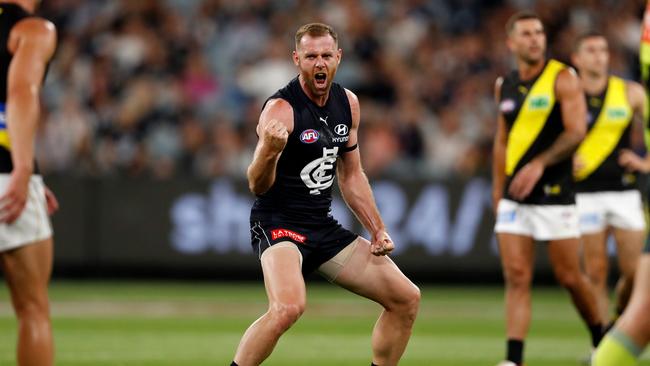
HM: Whoever writes the scripts in sport often does a superb job. You get back for round one, when people thought you’d never play football again, you kick a goal, only the 15th of your career, and the Blues come from behind and beat the Tigers.
SD: The scriptwriters did a bloody good job. But it’s not all about me – our group put in a lot of hard work. There’s a bit of my story lingering in the background of it all, but our group did a lot of hard work in the off season. That was a great reward for the work we’d all put in together, and a reward for complete buy-in and unity within the group. We have a special group here. We are tight.
HM: Can I show you your set shot goal? You just press play.
SD: (After watching his goal) I’ve watched it so many times. It still gives me goosebumps now. I find it fitting at times, with the two people that got to me first afterwards. I happened to turn to Charlie, who’d been through so much as well. It was our first game together in five years, after I missed two with my knee and he’d missed two with his knee. By the time he got back last year I had done my ankle. We’d been through a lot together, so he was number one. On my back shoulder was Crippa, who said afterwards he was behind me so he could watch it go through. He’s one of my best mates, and similarly to Charlie, we’d been through so much together. It was a very special moment.
HM: It looks as connected as it’s been for a long time, and your story I sense is a huge part of that connection.
SD: It’s been a big part of it. It’s brought us all very close together, and it’s a small part of a long journey with a fair few of the boys there. I’m looking forward to what our group is going to do. There’s a lot of belief in the way we are playing, and what we are doing.
HM: What have you learnt about yourself?
SD: If I set my mind to anything, I can do it. In a funny way, I feel like my determination takes over during these times. That will set me up for whatever happens in life. As I have spoken about a fair bit, the biggest lesson I have learnt is to stay grateful. Enjoy what you have, enjoy the people around you – that’s the best thing I have taken from it.
HM: You have shown us so much. Thanks for talking today, and good luck with whatever lies ahead.
SD: Thanks mate, I’ve enjoyed it.
As this goes to print, the Carlton Blues are two wins from two outings, and Sam Docherty has been sensational in both matches.



